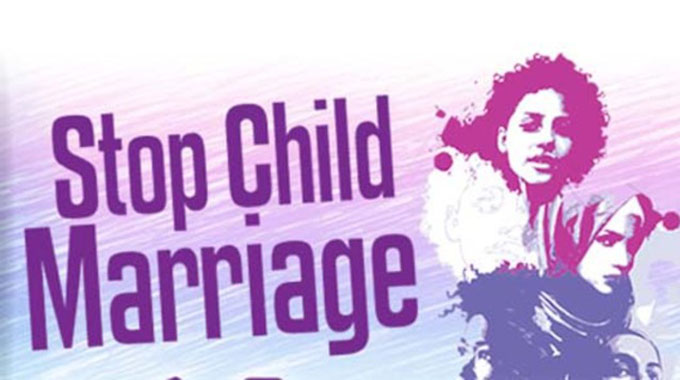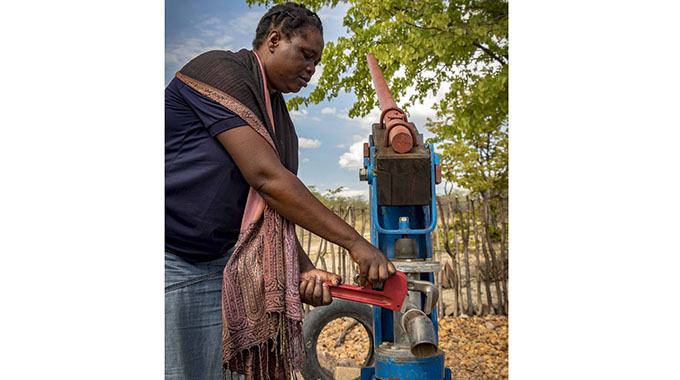Delay in alignment of laws: Major impediment to ending child marriages

Paidamoyo Chipunza Senior Reporter
In January 2016, the Constitutional Court ruled that the Marriage Acts, which permitted girls as young as 16 years to get married with their parents’ consent, was unconstitutional.
In its ruling in a case brought by Veritas (Mudzuru and another vs Minister of Justice and others), the court declared that:
Under the Constitution, 18 years is the minimum age of marriage in Zimbabwe
Section 22(1) of the Marriages Act and any other law, practice or custom authorising a person under 18 to marry is unconstitutional and invalid
From January 20, 2016, no one may enter into any marriage or other union, including a customary or religious union, before attaining the age of 18.
The Constitution recognises 18 years as the legal minimum age for marriage.
Later in the same year, the SADC Parliamentary Forum published a document entitled “Draft Model Law on Eradicating Child Marriage and Protecting Children Already in Marriage”.
This document provides guidance to parliamentarians, Ministries of Justice, policymakers and other stakeholders in SADC member states as they develop effective national laws to end child marriages and address inconsistencies in their current legal frameworks.
Late last year, Government launched the National Action Plan (NAP) and Communication Strategy Against Child Marriages.
Launched by First Lady Auxillia Mnangagwa, who is a strong advocate of ending child marriages, the plan is expected to see the formation of structures that will effectively coordinate, monitor and evaluate all initiatives against child marriages.
It is also expected to provide for enhanced advocacy for child-led initiatives and alignment of legislation to the Constitution, facilitate registration of births and marriages in Zimbabwe, build partnerships with traditional community-based organisations, religious groups and strengthen community-based child protection mechanisms.
While all these developments are positive steps in the right direction, more needs to be done and at a quicker pace than the current rate as children under the age of 18 years are still being married off because of lack of supportive legislation to back the 2016 Constitutional Court ruling.
Lawyer Miriam Tose Majome of Veritas Women said the major gap in the current legal framework is the slow pace in alignment of the Constitution to reflect that child marriages are illegal.
“Chapter 22 of the Marriages Act Chapter 5:11 urgently needs to be repealed so that there is no reference to 16 as the age girls can get married,” she said.
“Under Section 22 (the one that was repealed in the Mudzudzu ConCourt judgment), 16-year-old girls could marry with special consent.
“The Customary Marriages Act Chapter 5:08 is completely silent on the age of marriage, so it is a serious loophole as without any specific age stated, it is easy to marry off under-age girls using customary law and claim protection under the vagueness of the law.”
Ms Majome said while the intention to ending child marriages in the country was moving towards addressing existing gaps, the pace was very slow because the laws have not yet been amended, two years later.
“In actual practise, it is difficult to implement the judgment because there is no statutory backing,” she said.
“Ordinarily, there are laid down and written statutory provisions upon which to charge and convict offenders.
“Without statutory instruments/legislation, it is difficult to effect the charges.”
Ms Majome said the superior courts may be able to convict offenders under common law provisions, but the magistrates’ courts are severely hamstrung because the magistrates’ court is a court of statutes.
Everything the magistrates’ court does has to come from statues and legislation.
“While indeed the Constitutional Court judgment is now law and can be cited when dealing with offenders, our legal system relies on specific statutory provisions to base charges and conviction,” said Ms Majome.
“For example, on a police charge sheet, the specific legal provision that has been infringed is ordinarily cited, but it would be a misnomer to cite a judgment as having been infringed. The proper legal framework has to be put in place.”
Ms Majome said once laws are aligned, there was need for the community to monitor and report child marriage offenders and protect under-age girls.
Recently, speaking during the official launch of “Girls Get Equal”, a girl-led global campaign for gender equality, Chief Mutasa said traditional leaders were doing their best to champion the rights of the girl child and women in their societies.
He bemoaned the delay in alignment of laws as the major impediment to punishment of offenders.
“We are playing our role as traditional leaders, but our biggest let down is the delay in aligning laws that deal with early marriages with the Constitution,” said Ms Majome.
Chief Mutasa echoed Ms Majome’s sentiments that the 2016 Constitutional Court judgment was difficult to implement without backing statutes.
“The judgment that outlawed child marriages in 2016 will remain an empty threat without criminal sanctions,” he said.
Teenage girl, Masline Gaipiko, also called on Parliament to prioritise and pass laws that prohibit child marriages.
“Three years after the Constitutional Court nullified child marriages, there is still no law in place and girls continue to be married off,” she said.
“We demand seriousness on this and a law to end this.”
Knowledge management and communications manager at Panos Institute Southern Africa Mr Vusumuzi Sifile said while his organisation was pleased that a number of countries in the region have put in place policies and measures to protect girls from the harm of child marriages, more still needed to be done.
“It is good to see progress towards putting in place and enforcing robust laws and policies specifically designed to address child marriage,” he said.
“However, the response requires more than laws and policies, and some of the drivers of child marriage border on cultural and traditional practices. There is, therefore, need to engage stakeholders such as traditional leaders, religious leaders and other community level opinion leaders.”
Mr Sifile said to that effect, Panos Institute Southern Africa has intensified its engagement of traditional leaders and religious leaders to play a prominent role in addressing child marriage.
He said Panos has also conducted human rights trainings for traditional leaders, and also developed community booklets to guide traditional leaders and their subjects to work together to address this vice.
“As an organisation, we fully subscribe to the SADC Model Law on eradicating child marriage and protecting children who are already in marriage, as this will enhance the accountability of governments in the region in the formulation, enactment and implementation of laws, policies and other interventions to address child marriage,” said Mr Sifile.









Comments